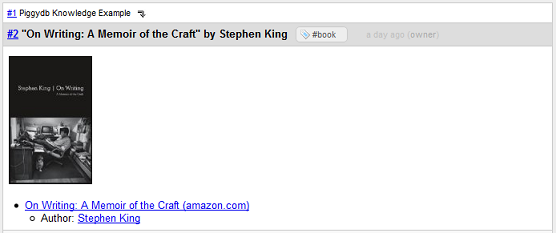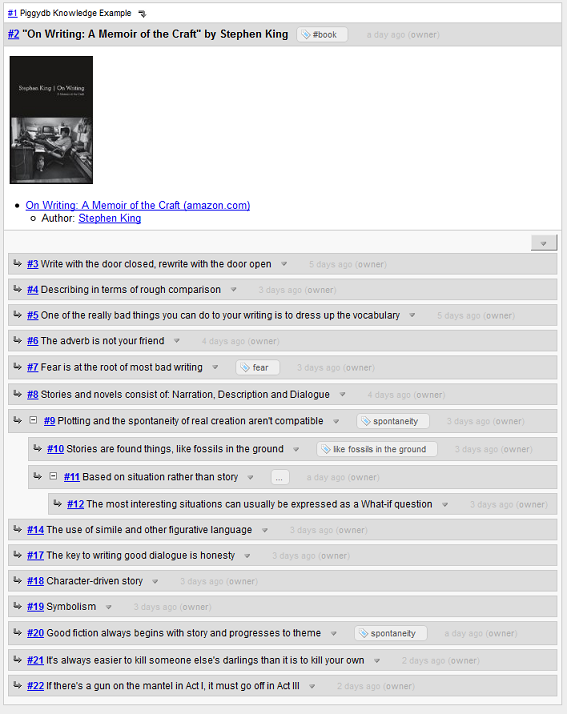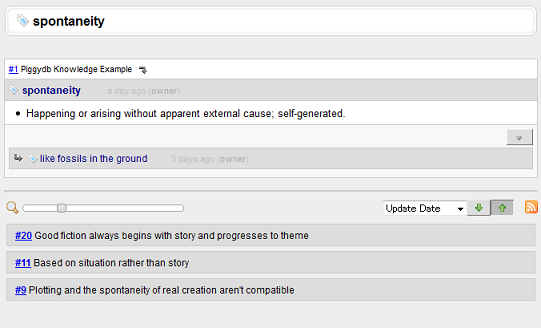Let’s Play: Piggydb Knowledge Creation #1 – “On Writing” by Stephen King
Posted: September 25, 2012 Filed under: letsplay 2 CommentsI’ve launched yet another demo for Piggydb.
Piggydb Knowledge Example – http://piggydb.jp/example/
I’m going to show you an actual example of Knowledge Creation, which is introduced in “The Piggydb Way“, by combining with this series of articles “Let’s Play: Piggydb Knowledge Creation”.
To be honest, I have no idea of what it will turn into or what kind of knowledge will be created. So I’m looking forward to seeing how it goes.
You should note that this is just one of countless ways of using Piggydb and I don’t intend to declare that this is the proper way while it would be a certainly interesting and creative way that I think is worth to try out.
So, let’s get started.
The basic process is quite simple. You read randomly selected books and record passages that interest you as knowledge fragments in your Piggydb.
Stephen King’s “On Writing” is the book I selected for the first installment of this series. I randomly picked this book up from my unread books shelf.

First of all, I created a fragment that represents the book and tagged it #book so that I can list all the books I’ve input later on.
Then, I added sub-fragments of the book fragment for the passages that interest me.
It is a little bit tiresome to manually type all the passages into Piggydb …
After that, I looked through the fragments and found the concepts that interest me. I created tags for these concepts: “fear”, “spontaneity”, “like fossils in the ground”.
At first, these concepts don’t necessarily need to be a word or noun. “like fossils in the ground” is a phrase in this case. And even a sentence could be a tag. As your database grows, you will probably find (or even invent) suitable words for the concepts.
Ok, that’s it for this time. I hope I can find unexpected correlations and concepts as I input more books.
If you have any recommendations for books (essay or fiction would be better) or find interesting things in the demo database, please drop me a line.
So, thank you for reading this far and please look forward to the next installment 😉





This is just brilliant! Thanks for this example; to be honest, I’m more interested in seeing how it evolves than in reading another Stephen King novel…
A couple of points:
The live example at http://piggydb.jp/example is exactly what I had in mind with the “publishing” functionality I suggested elsewhere. How is this example done? Are you running the piggydb-standalone.jar on a Linux server? Is it that simple? Have I missed something?
Re collecting the content, in this case your source was a printed book, but if you were working with text available on your PC, there are a number of options to make the process easier: some information managers have got a “clipboard follow” mode; whenever you copy something in any program, they automatically create a fragment with it. The good thing about it is that you can stay focused on the collection, and deal with the organisation later.
You may be able to simulate the above with a clipboard manager like Clipcache; look for “Clipboard Routing” here http://www.xrayz.co.uk/clipcache/
Hi Alexander, thank you for your comment.
> How is this example done?
I understand what you mean by “publishing” now. Though the default package is supposed to be used as a standalone app, Piggydb is actually a web app, so it can be naturally deployed on a web server and accessed via the Internet.
Piggydb provides three types of packages: standalone, all-in-one, war. You can run the last two packages as long as the server has Java runtime installed.
If you want to make the content public, which means any visitors can see (not edit) the content without logged in like http://piggydb.jp/example, you can enable Anonymous Access via the setting:
http://piggydb.jp/en/fragment.htm?id=18
The tricky part is that you have to look for a server that supports Java.
Re. clipboard. thanks for the info. Yea, it would be definitely easier to handle text inside digital documents. I’ve been thinking about implementing a bookmarklet to easily create a fragment from Web content like tumblr.
However, there is an intention behind using the source from outside of the Internet (a book in this case). I hope to explain that in future episodes.